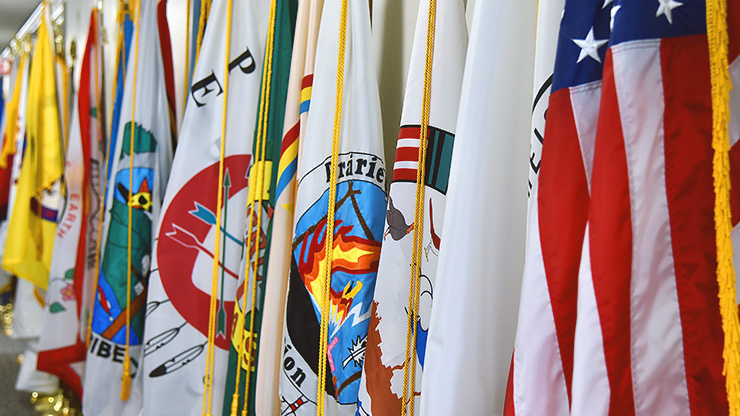
- Details
- By Levi Rickert
Opinion. The federal government's understanding of tribal nations often requires basic education with each new administration. Within Native communities, this process is often referred to as "Indians 101," acknowledging the frequent lack of understanding among non-Natives regarding tribal issues and concerns.
Some presidents arrive with a stronger foundation in tribal affairs than others. For example, Joe Biden’s extensive tenure in Washington gave him a solid grasp of an understanding of tribal sovereignty. His commitment was demonstrated in his selection of Deb Haaland, a citizen of the Laguna Pueblo, as Secretary of the Interior. Upon her confirmation, Haaland made history as the first Native American to serve in a presidential cabinet in a secretarial role.
As Donald Trump began his second term on January 20, one might have assumed that his administration had gained an understanding of the United States' unique government-to-government relationship with tribal nations during his first term. However, since the beginning of the Trump second term on January 20 it appears the new administration appears to be clueless about the status of tribes in the United States.
This status predates the United States government. Prior to 1776, the sovereign governments of England, France, and Spain entered into treaties with sovereign tribal nations on this continent.
Treaties are not symbolic gestures; they are legally binding agreements between sovereign nations. Just as the United States signs treaties with foreign nations, it has entered into 374 treaties with tribal nations, affirming their self-governing status. These agreements are a clear acknowledgment that tribal sovereignty is based on political status, not race.
Before European settlers arrived, tribal nations governed themselves, established trade relationships, formed alliances, and managed complex societies with their own laws and customs. These were, and still are, sovereign nations. The fact that tribal nations maintain this political status today is not a matter of racial classification but rather of legal and historical recognition. The U.S. Constitution itself acknowledges tribal sovereignty, treating Native nations as distinct political entities capable of engaging in government-to-government relations.
For far too long, tribal nations and Native people have been misunderstood by the broader American public. One of the most common misconceptions is the belief that Native American identity is solely racial rather than political. This misunderstanding has serious consequences, influencing everything from Supreme Court decisions to everyday discussions about Indigenous rights. The record must be clear: Tribal nations are political entities, not racial groups.
Despite this legal framework, the misconception that tribal identity is racial rather than political has been used to undermine tribal nations’ rights. A recent example is the Brackeen v. Haaland U.S. Supreme Court case that challenged the Indian Child Welfare Act (ICWA), where opponents argued that ICWA constitutes racial discrimination. Such arguments dangerously ignore the fact that ICWA is based on the political status of tribes, not racial preference. The act was designed to protect Native children and preserve the sovereignty of tribal nations in child welfare cases. By mischaracterizing tribes as racial groups rather than political entities, opponents of ICWA attempted to erode tribal sovereignty.
The consequences of this misunderstanding extend beyond the courts. Tribal sovereignty is often dismissed in public discourse because many people do not grasp that Native American identity is rooted in citizenship within a tribal nation, not racial classification. Unlike racial groups, which are defined by shared ancestry and social categorization, tribal nations determine their own membership based on their laws and traditions. While ancestry may be a factor, it is ultimately political, not racial, criteria that govern tribal citizenship.
Efforts to conflate tribal status with race are not just incorrect; they are harmful. They serve to weaken treaty rights, limit tribal self-determination, and justify policies that erode Indigenous sovereignty. The attack on Native political identity is a direct attack on the inherent rights of tribal nations to govern themselves.
The solution is education and advocacy. Americans must understand that tribal nations exist as distinct political entities with legal rights, responsibilities, and sovereignty. The U.S. government has a trust obligation to tribal nations precisely because they are sovereign governments, not because of any racial classification. Recognizing this distinction is not only a matter of legal accuracy but also a step toward honoring the commitments made to Indigenous peoples.
Tribal sovereignty is not a relic of the past—it is a living, legal, and political reality. It is time for the United States to respect and uphold this truth, ensuring that tribal nations are recognized for what they truly are: self-governing, sovereign entities that exist not because of race, but because of the enduring power of Indigenous political identity.
Thayék gde nwéndëmen - We are all related.
More Stories Like This
Jesse Jackson Changed Politics for the BetterNative News Online at 15: Humble Beginnings, Unwavering Mission
From the Grassroots Up, We Are Strengthening the Cherokee Nation
Friday the 13th: When Superstition Proves More Powerful Than Law
Congress Must Impose Guardrails on Out-of-Control ICE
Help us defend tribal sovereignty.
At Native News Online, our mission is rooted in telling the stories that strengthen sovereignty and uplift Indigenous voices — not just at year’s end, but every single day.
Because of your generosity last year, we were able to keep our reporters on the ground in tribal communities, at national gatherings and in the halls of Congress — covering the issues that matter most to Indian Country: sovereignty, culture, education, health and economic opportunity.
That support sustained us through a tough year in 2025. Now, as we look to the year ahead, we need your help right now to ensure warrior journalism remains strong — reporting that defends tribal sovereignty, amplifies Native truth, and holds power accountable.
 The stakes couldn't be higher. Your support keeps Native voices heard, Native stories told and Native sovereignty defended.
The stakes couldn't be higher. Your support keeps Native voices heard, Native stories told and Native sovereignty defended.
Stand with Warrior Journalism today.
Levi Rickert (Potawatomi), Editor & Publisher

